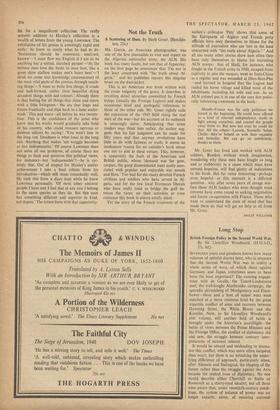Not the Truth
A Scattering of Dust. By Herb Greer. (Hutchin- son, 21s.)
MR. GREER, an American photographer, was one of the first journalists to visit and report on the Algerian nationalist army, the ALN. His book has many faults, but not that of hypocrisy; on the first page he announces that 'I'm not in the least concerned with "the truth about Al- geria,"' and his publisher repeats this singular boast on the dust-jacket.
This is an American war book written with the crude vulgarity of the genre. It describes in revolting detail atrocities committed by French troops (usually the Foreign Legion) and makes occasional brief and apologetic references to those of the other side. Mr. Greer rightly calls the repression of the 1945 Setif rising the real start of the war—but his account of its outbreak is amazingly naïve. Anticipating that some readers may think him unfair, the author sug- gests that no fair judgment can be made for fifty years and that anyway revolutions have little to do with fairness or truth; it seems an inadequate reason for an outsider's book about one not to aim at these virtues. This, however, is apparently the fault of the American and British public, whose 'demand was for gore, corpses, the good dismembered meat easily asso- ciated with popular and enjoyable war novels and films.' Too bad for the many devoted French civilians and soldiers who have served in Al- geria, and for the few local European liberals who have really tried to bridge the gulf be- tween the races; on their activities or even existence this book is almost totally silent.
Yet the story of the French treatment of the
author's colleague 'Pete' shows that some of the Europeans of Algiers and French petty officials have only themselves to blame for the attitude of journalists who are 'not in the least concerned with "the truth about Algeria."' And all too many other stories show how often they have only themselves to blame for recruiting ALN troops: that of Hadj, for instance, who fought in the French army in 1940, escaped from captivity to join the maquis, went to Indo-China as a regular and was wounded at Dien-Bien-Phu —and learned in hospital that the Legion had raided his home village and killed most of the inhabitants, including his wife and son. As an ALN colonel put it in one of the very few politi- cally interesting comments in the book :
Mendes-France was the only politician we feared in the beginning. He could have offered us a kind of internal independence, made us fight among ourselves, and coaxed the people away from us. But now not even he could do that. All the others—Lacoste, Soustelle, Satan, Challe—they've helped us with their stupidity and brutality. We can go on indefinitely, thanks to them.
Mr. Greer has lived and worked with ALN soldiers. Readers without much imagination, wondering why these men have fought so long and so stubbornly in a cause which must have seemed hopeless, will find plenty of indications in his book. But far more interesting—perhaps even hopeful—at this moment is a different question: why after seven years of savage war- fare those ALN leaders who were thought most extreme have come round to seeking negotiation and future co-operation with France. Those who want to understand the state of mind that has made them do that will get no help at all from Mr. Greer.
PHILIP WILLIAMS


































 Previous page
Previous page